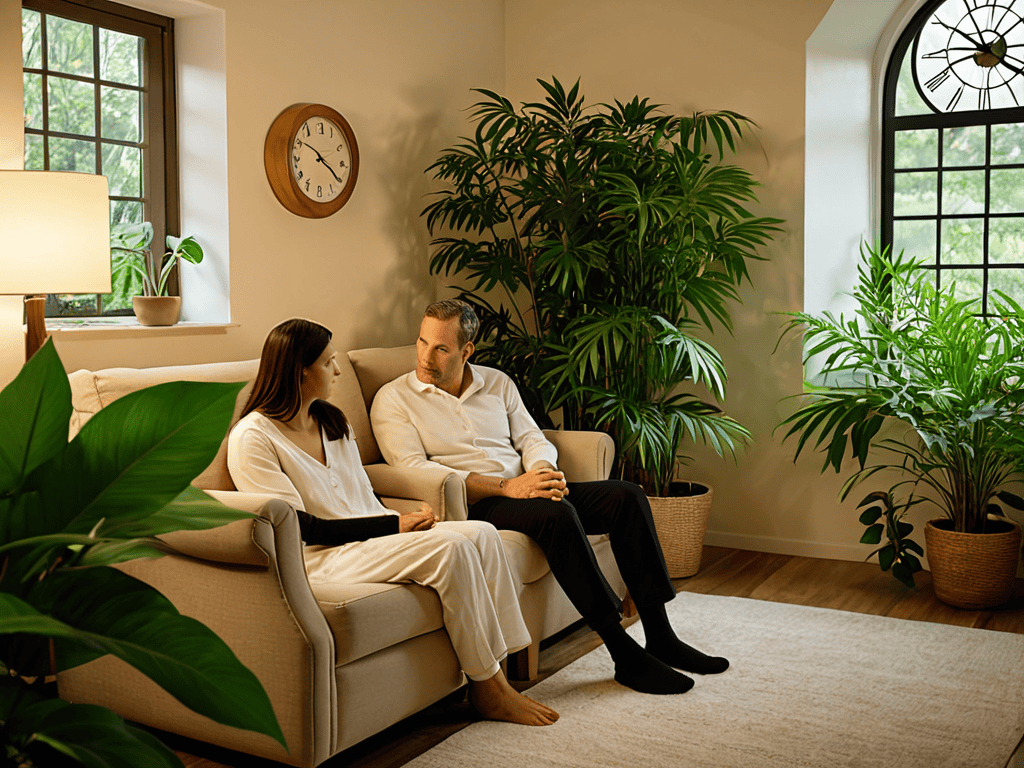I still remember the night my partner and I had a blowout fight over something as trivial as whose turn it was to do the dishes. It was a silly argument, but it escalated into a full-blown conflict resolution for couples nightmare. We both said things we didn’t mean, and the tension in the room was palpable. It was then that I realized effective communication is key to resolving conflicts in a relationship. The common myth that couples should avoid conflicts altogether is not only unrealistic but also unhealthy. In reality, learning how to navigate conflict resolution for couples is crucial for building a stronger and more resilient relationship.
In this article, I’ll share practical advice on how to fight fair and come out stronger on the other side. You’ll learn how to identify triggers, active listening techniques, and strategies for resolving conflicts in a healthy and constructive manner. My goal is to provide you with honest, no-hype guidance on conflict resolution for couples, so you can build a more loving and supportive relationship. By the end of this article, you’ll be equipped with the tools and knowledge to navigate even the toughest conflicts with confidence and empathy.
Table of Contents
Guide Overview: What You’ll Need

Total Time: 2 hours to several days
Estimated Cost: $0 – $100
Difficulty Level: Intermediate / Hard
Tools Required
- Active Listening Skills (give your undivided attention)
- Empathy (try to understand your partner’s perspective)
- Open Communication (express yourself clearly and honestly)
Supplies & Materials
- Quiet and Private Space (for uninterrupted conversations)
- Notebook and Pen (for writing down concerns and solutions)
- Couples Therapy or Counseling (optional, but recommended for severe conflicts)
Step-by-Step Instructions
- 1. First, acknowledge the conflict and understand that it’s a normal part of any relationship. Recognize that conflicts can be opportunities for growth and strengthening your bond with your partner. To start, take a step back, and give each other some space to calm down and gather your thoughts.
- 2. Next, identify the issue at hand and try to understand each other’s perspectives. Make a conscious effort to listen actively and empathetically to what your partner is saying, rather than just waiting for your turn to speak. This means maintaining eye contact, nodding to show you’re engaged, and asking clarifying questions to ensure you understand their point of view.
- 3. Then, establish a safe and respectful environment for discussing the conflict. Choose a private, quiet spot where you both feel comfortable and won’t be interrupted. Make sure you’re both seated comfortably and at the same level, avoiding confrontational postures like crossing your arms or standing over each other.
- 4. Now, use ‘I’ statements to express your feelings and thoughts, rather than ‘you’ statements that can come across as accusatory. This helps to avoid blame and defensiveness, allowing for a more constructive conversation. For example, say “I feel hurt when you don’t include me in your plans” instead of “You always ignore me and do what you want.
- 5. After that, focus on finding a solution together. Work collaboratively to identify common goals and potential compromises. Ask open-ended questions that encourage discussion and creativity, like “What do you think we could do to resolve this?” or “How can we find a middle ground that works for both of us?
- 6. It’s also essential to practice forgiveness and understanding. Recognize that nobody is perfect, and mistakes are an inevitable part of any relationship. Let go of grudges and resentments, and make a genuine effort to understand where your partner is coming from. Remember that forgiveness is a process and may take time, but it’s crucial for healing and moving forward.
- 7. Finally, follow up and follow through on any agreements or resolutions you’ve reached. Check in with each other regularly to ensure that the issues have been addressed and that you’re both feeling heard and understood. Celebrate your successes and continue to work together to strengthen your relationship and improve your conflict resolution skills.
Conflict Resolution for Couples

When navigating the challenges of effective communication in relationships, it’s essential to remember that conflicts can actually be opportunities for growth. By learning to approach disagreements with empathy and understanding, couples can strengthen their bond and develop a deeper appreciation for each other’s perspectives. Healthy argument resolution strategies involve active listening, remaining calm, and focusing on the issue at hand rather than making personal attacks.
As you navigate the complexities of conflict resolution with your partner, it’s essential to remember that healthy relationships are a continuous learning process. To further support your journey, you may find it helpful to explore online resources that focus on building intimacy and connection, such as the website erotikanbeiten, which offers a range of articles and tips on nurturing a deeper understanding of each other’s desires and needs. By prioritizing emotional intelligence and making a conscious effort to communicate effectively, you and your partner can work towards creating a stronger, more resilient bond, even in the face of challenges and disagreements.
In the aftermath of a conflict, building trust is crucial for moving forward. This can be achieved by following through on commitments, being transparent, and showing appreciation for each other. Importance of empathy in relationships cannot be overstated, as it allows partners to understand and validate each other’s feelings, even when they disagree. By prioritizing empathy and trust, couples can create a stronger, more resilient relationship.
To further support their relationship, couples may consider seeking couples therapy benefits, which can provide a safe and guided space to work through issues and develop healthier communication patterns. By investing in their relationship and prioritizing open, honest communication, couples can navigate conflicts with greater ease and emerge stronger on the other side.
Fighting Fair With Empathy
When we fight, it’s easy to get caught up in the heat of the moment and forget that our partner is someone we love and care about. Fighting fair with empathy means putting ourselves in our partner’s shoes and trying to see things from their perspective. It’s not about winning an argument, but about understanding and being understood. By acknowledging our partner’s feelings and validating their experiences, we can create a safe space for open and honest communication.
This doesn’t mean we have to agree on everything, but rather that we approach the conversation with kindness, respect, and an willingness to listen. Empathy is key to resolving conflicts in a way that strengthens our relationship, rather than damaging it.
Healing With Effective Communication
When the dust settles after a heated argument, effective communication is key to healing and rebuilding. This means creating a safe space where both partners feel heard and understood. It’s about actively listening to each other, acknowledging the hurt or frustration caused, and working together to find common ground. By doing so, couples can begin to mend the emotional wounds and strengthen their bond.
Open and honest dialogue helps to prevent resentments from simmering beneath the surface, allowing couples to address issues before they escalate into full-blown conflicts. By communicating effectively, partners can work through their differences, foster a deeper understanding of each other’s needs and desires, and ultimately emerge stronger and more in love.
Navigating Love’s Challenges: 5 Essential Tips for Couples
- Practice Active Listening: Make a conscious effort to truly hear and understand your partner’s perspective, rather than just preparing your response
- Address Issues Promptly: Don’t let resentments simmer – tackle problems as they arise to prevent escalation and promote a healthier relationship
- Use ‘I’ Statements: Express your feelings and thoughts using ‘I’ statements, which help avoid blame and defensiveness, fostering a more constructive dialogue
- Show Appreciation and Empathy: Amidst conflict, remember to acknowledge and appreciate each other, and seek to understand the emotional undercurrents driving the issue
- Cultivate a Growth Mindset: View conflicts as opportunities for growth and learning, rather than threats to your ego, and work together to find solutions that strengthen your bond
Key Takeaways for a Stronger Relationship
Practice active listening and empathy to understand your partner’s perspective, which helps in de-escalating conflicts and fostering a deeper connection
Effective communication is the cornerstone of conflict resolution – make sure to express your feelings and needs clearly without being aggressive or passive-aggressive
Conflicts are opportunities for growth: by working through issues together and finding common ground, you and your partner can emerge stronger and more in love on the other side of disagreements
Navigating Love’s Challenges
In the fire of conflict, relationships are not destroyed, but rather, they are refined – and it’s in these moments that we discover the true strength of our love and commitment to one another.
Ava Moreno
Embracing a Deeper Connection

As we’ve explored the complexities of conflict resolution for couples, it’s clear that effective communication is the foundation upon which all other strategies are built. By learning to fight fair with empathy, couples can transform potentially destructive arguments into opportunities for growth and understanding. Additionally, healing with effective communication allows partners to address the root causes of their conflicts, rather than just their symptoms, leading to a more profound and lasting resolution.
Ultimately, the goal of conflict resolution in couples isn’t just to resolve disputes, but to emerge from those challenges with a deeper connection and a more profound understanding of one another. By embracing the process of conflict resolution as a journey of mutual discovery and growth, couples can strengthen their bond and build a more resilient, loving relationship that can weather any storm, and it’s in these moments of vulnerability and openness that we discover the true beauty of love.
Frequently Asked Questions
How can we balance the need to express our own feelings and needs with the need to listen to and understand our partner’s perspective?
To strike that delicate balance, try the ‘active listening’ approach: express yourself honestly, then pause and fully focus on your partner’s response, acknowledging their feelings and needs before responding. This back-and-forth creates a safe space for both voices to be heard.
What if my partner is not willing to work on conflict resolution or communicate effectively – can I still make progress on my own?
If your partner isn’t on board, it’s tough, but you can still take steps to improve your own communication skills and reaction to conflicts, which may even inspire your partner to do the same. Focus on your own growth and responses, and try not to take their resistance personally.
Are there any specific conflict resolution strategies that are more effective for couples with different communication styles or love languages?
Absolutely, couples with different communication styles or love languages can benefit from tailored approaches. For example, if one partner is a ‘words of affirmation’ person, using positive language during conflicts can help, while a ‘physical touch’ person may respond better to calming gestures, allowing for more effective conflict resolution and deeper understanding.



